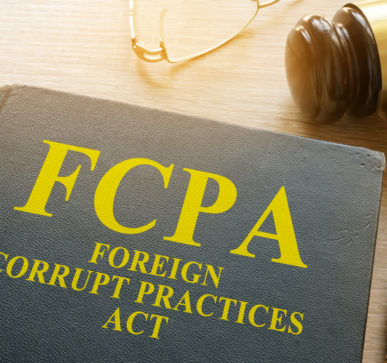On July 3, 2020, the US Department of Justice (DOJ) released “A Resource Guide to the U.S. Foreign Corrupt Practices Act (FCPA), Second Edition”. This updated edition is a concerted effort of the DOJ, Securities Exchange Commission (SEC), the US Department of Commerce and the US Department of State. The Resource Guide, intended for business of all sizes (from small to multinationals with subsidiaries), presents how the DOJ and the SEC:
- Make decisions to open investigations
- Bring charges
- Assess voluntary self-disclosure
- Assess full cooperation
- Assess timely and appropriate remediation
- Evaluate implementation of an effective compliance and ethics program
The guide also describes what is covered under the FCPA’s:
- anti-bribery and accounting provisions
- definition of a “foreign official”
- jurisdictional reach
- types of proper and improper payments
- application of successor liability in mergers/acquisitions
- effective corporate compliance program
- different types of civil and criminal resolutions available
Best Practices References
For Best Practices, the Guide makes reference to the DOJ updated guidance of June, 2020 “Evaluation of Corporate Compliance Programs” as a guide for prosecutors when making conclusions regarding the effectiveness of a corporation’s compliance program at the time of an offense and determining an appropriate form of resolution or prosecution; monetary penalty, and compliance obligations contained in any corporate criminal resolution. The Guide refers to these publications as roadmaps for corporations to achieve effective compliance programs and implement measures for preventing and detecting foreign bribery:
- The Department of Commerce’s International Trade Administration (2004): A Manual for Managing a Responsible Business Enterprise in Emerging Market Economies
- The Department of State (2000): Business Risk Management
- The OECD’s 2009 Anti-Bribery Recommendation and its Annex II: Good Practice Guidance on Internal Controls, Ethics, and Compliance
Corporations of all sizes ought to ensure that their compliance programs include:
- A mechanism for an organization’s employees to report suspected or actual misconduct or violations of the company’s policies on a confidential basis without fear of retaliation.
- An efficient, reliable, and properly funded process for investigating the allegation and documenting the company’s response, including any disciplinary or remediation measures taken.
- Taking “lessons learned” from reported violations and the outcome of resulting investigation to update internal controls and compliance program and focus future training on such issues.
- A regular review and improvement to compliance programs so that they do not become stale.
- A detection of new risk areas.
- Performing adequate FCPA due diligence prior to a merger or acquisition.
- A have a well-functioning and appropriately funded mechanism for the timely and thorough investigations of any allegations or suspicions of misconduct by the company, its employees, or agents.
- An established means of documenting the company’s response for misconduct, including any disciplinary or remediation measures taken.
- Integration of “lessons learned” from any misconduct into the company’s policies, training, and controls.
Do you have a Corporate Governance Expert?
Companies of all sizes in all industries ought to ensure that they are in compliance with the FCPA. In order to be able to properly analyze the causes of the misconduct and timely and appropriately remediate those causes to prevent future compliance breaches, companies ought to consult their Corporate Governance Expert.





